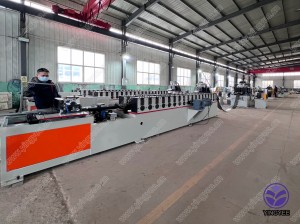
The Evolution and Functionality of Roof Tile Rolling Machines
Roof tiles are an essential component of modern architecture, providing not only aesthetic appeal but also protection against the elements. As the demand for efficient and quality roofing materials escalates, the importance of advanced manufacturing equipment becomes increasingly evident. Among these machines, the roof tile rolling machine stands out, revolutionizing the way roofing materials are produced.
Understanding Roof Tile Rolling Machines
A roof tile rolling machine is sophisticated equipment designed to manufacture roof tiles with precision and efficiency. These machines use a combination of metal sheets and advanced rolling techniques to produce tiles that can mimic various traditional materials, such as clay or slate, while offering enhanced durability and performance. Typically, the process involves feeding raw metal sheets into the machine, where they undergo multiple stages of shaping and forming, resulting in tiles that are ready for use in construction.
How Roof Tile Rolling Machines Work
The operation of a roof tile rolling machine can be understood through several key steps
1. Feeding Raw Material The process begins with the feeding of metal sheets, commonly made of steel or aluminum, into the machine. Quality control measures ensure that the materials meet specific standards before being processed.
2. Roll Forming As the metal sheets move through the machine, they pass through a sequence of rollers that gradually shape them into the desired tile profile. This roll forming process is crucial, as it determines the final shape and appearance of the tiles. Different roller setups can produce various styles, from flat tiles to those with intricate patterns.
3. Cutting and Finishing Once the tiles are formed, they are cut to the required lengths. Some machines include a hydraulic cutting mechanism that ensures clean and accurate cuts. After cutting, tiles may undergo additional treatments, such as painting or coating, to enhance their resistance to environmental factors and improve their visual appeal.
4. Quality Inspection After production, the tiles are subjected to rigorous quality inspection to ensure they meet structural and aesthetic standards. This step is vital for maintaining the reputation of manufacturers and ensuring customer satisfaction.
Advantages of Roof Tile Rolling Machines

The adoption of roof tile rolling machines offers several advantages over traditional tile manufacturing methods
- Efficiency These machines significantly increase production speed, allowing manufacturers to meet high market demand without compromising on quality.
- Cost-effectiveness By reducing labor costs and minimizing material wastage, roof tile rolling machines present a more economical solution for tile production.
- Versatility Modern machines can produce a wide variety of tile designs, catering to the diverse preferences of consumers and architects. This flexibility allows manufacturers to adapt to changing market trends swiftly.
- Durability Metal roof tiles produced by rolling machines are generally more durable than traditional materials, providing better resistance to harsh weather conditions and a longer lifespan overall.
The Future of Roof Tile Manufacturing
As technology advances, the roof tile rolling machine will continue to evolve. Emerging innovations such as automation, artificial intelligence, and smart manufacturing techniques are likely to refine the production process further. These advancements could lead to greater precision, reduced waste, and enhanced customization options for customers.
Moreover, the growing trend toward sustainability in construction will also influence the design and operation of these machines. Manufacturers may increasingly seek to integrate recyclable materials and energy-efficient technologies into their processes, aligning with global efforts to reduce the environmental footprint of building materials.
Conclusion
The roof tile rolling machine represents a significant leap forward in the manufacturing of roofing materials. With its ability to produce high-quality, durable, and aesthetically pleasing tiles efficiently, it plays a crucial role in the construction industry. As technology continues to advance, these machines will likely become even more sophisticated, offering new possibilities for innovation in roofing solutions. The roof tile rolling machine not only facilitates the creation of beautiful roofs but also contributes to the resilience and sustainability of the built environment, making it an invaluable asset in modern construction.